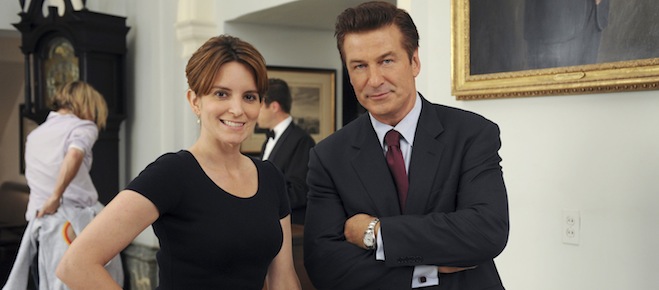The influence of this year’s U.S. election on U.S. television
Hint: it’s certainly more than 2008, and definitely more than 2004
30 ROCK — “Unwindulax” Episode 704 — Pictured: (l-r) Tina Fey as Liz Lemon, Alec Baldwin as Jack Donaghy — (Photo by: Ali Goldstein/NBC/NBCU Photo Bank)
Share

The interesting thing about this U.S. election’s impact on U.S. television is the fact that its had any impact at all. Remember all the references TV made to the election of 2004? No? That’s because there were hardly any. Even though it was a close, hard-fought election in a deeply divided country–just like this one–TV mostly stayed away from it. It was a very timid time for TV: networks were panicked by 9/11, by the FCC, by the shrinking audience (it’s still shrinking now, but they’re used to it).
And so open political references were almost taboo unless they were done obliquely, like Arrested Development‘s parallels between the Bluth and Bush families. The Simpsons famously never had a caricature of George W. Bush on the show, let alone John Kerry. South Park‘s election episode in 2004 portrayed the election allegorically as “a choice between a giant douche and a turd sandwich,” making the episode a perfect capsule of how mindless Trey Parker’s centrism was at the time.
Since then, there’s been something of a thaw in television, and while it’s hardly become daring or anything, there are a lot more direct references to this election than eight or even four years ago. At least three half-hour comedies have done episodes where characters argue over the election, and mention the candidates by name. The New Normal was the first, then came 30 Rock. Then came Tim Allen’s Last Man Standing, a show that I thought was developing into a pretty good innocuous family sitcom; Allen apparently didn’t think so, though, because the show is back this year retooled (at his behest) into an All in the Family imitator, and the season premiere was about Allen arguing with his daughters over the election, and he thinks Obama is from Kenya, and makes “community organizer” jokes, and the whole episode sounded like a couple of politically-opposed Twitter feeds mashed together into a script.
Well, most political arguments on scripted TV (or unscripted, for that matter) sound like Twitter feeds, since there’s no room for nuance or developed arguments, even assuming the writers have any on hand. Usually what happens is one character says something that’s a grotesque caricature of the Republican or Democratic position, and the other character either a) responds with an equally grotesque caricature of a reply, or b) is completely stopped in his tracks by the incredible all-consuming logic of an argument any real person could rebut in five seconds. This is why 30 Rock was the best of these three episodes: apart from having the funniest writers, it was intentionally silly and caricatured, and made the political arguments more about the characters’ personal issues.
But even if those other two shows were trying to be All in the Family and failing, the fact that they even tried is a sign that television has emerged a little bit from the defensive crouch of the ’00s. Of course there are other reasons why shows might choose not to deal with topical issues like elections, most obviously the fact that an election episode dates the show for all time. (However, I think producers are naive to believe that avoiding topical references will help them be “timeless” in syndication. I watched shows in the ’80s that mentioned the election without ever mentioning the candidates’ names, but they still had the hair, the clothes, and the brick cellphones, and nothing was going to keep them from becoming dated.) And, as noted, these issues are usually beyond what the show is capable of dealing with anyway. But all in all, it’s probably better to see shows deal with issues rather than avoid them, so I think I’m glad we live in an era when the words “Obama” and “Romney” are not among the seven words you can’t say on TV.